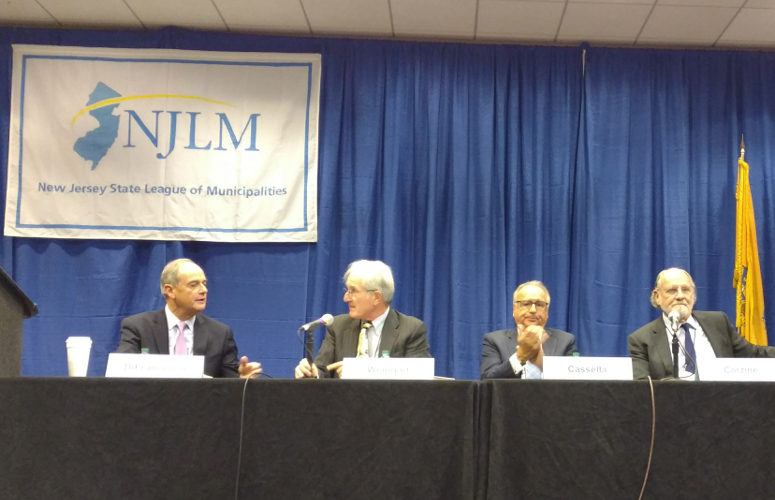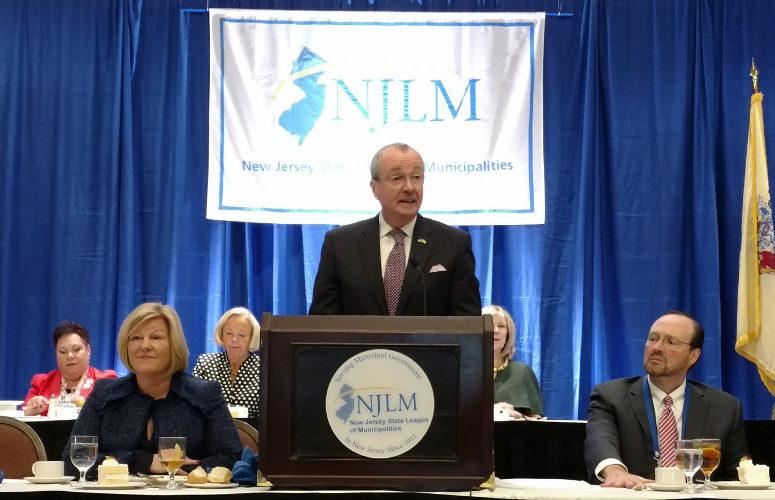
Former NJ Governors, Others Grade Murphy at the League of Municipalities Conference
By Anthony Birritteri, Editor-in-Chief On Nov 20, 2019Five former New Jersey governors weighed in on Gov. Phil Murphy’s performance at his two-year point in office, with many giving him high marks on policy achievements, but mediocre marks on dealing with the State Legislature.
At a session within today’s 104th Annual League of Municipalities Conference in Atlantic City, former Governor James J. Florio said Murphy has done “interesting things” his first two years in office, including yesterday’s announcement in which the governor signed an executive order (EO) doubling the amount of offshore wind energy to be generated in the state from 3,500 megawatts (MW) by 2030 to 7,500 MW by 2035.
Florio said most people in the state do not realize that “scads and scads” of jobs will be generated in this industry sector because of the EO measure, and that New Jersey will be at the center of the wind generation movement in the nation.
However, Donald T. DiFrancesco, who served as acting governor from 2001 to 2002, said Murphy continues to have problems in dealing with politicians in the Legislature, including members of his own party. “Gov. Murphy came into office without a background in New Jersey politics. That makes it hard for someone in their first year to enact their platform.”
Former Governor Richard Codey, who served as acting governor from 2004 to 2006, was more blunt, saying, “We are seeing a show in Trenton that we have never seen before.”
He commented that the creation of select oversight committees in the Legislature, rather than having issues handled in regular committees, is “aimed at embarrassing the governor.”
John Bennett, a former state senate president who served as acting governor for four days in January of 2002, said Murphy should encourage more communication with the Legislature and that everyone should put aside their political differences in order for the state to move forward.
“There is no Democratic or Republican solution, but a people solution,” Bennett said.
Jon S. Corzine, who served as governor from 2006 to 2010, recognized Murphy for “unequivocally” completing a series of progressive initiatives such as increasing the minimum wage to $15 an hour, making changes to paid family leave and sick leave laws, increasing the earned income tax credit two years in a row, having the state rejoin the Regional Greenhouse Gas Initiative and promoting offshore wind energy.
After hearing the various governors commend Murphy on his achievements, panel participant Brigid Callahan Harrison, professor of political science and law at Montclair State University, said she felt she was living in a different state than the former governors in the room.
While two governors said that New Jersey’s winning more Democratic Congressional seats in the last election was due to Gov. Murphy, Harrison said it had little to do with people liking Murphy and more to do with people disliking President Trump.
Harrison said Murphy’s failure has been his inability to negotiate with the Legislature and vice versa. “We have two entities digging in their heels, wanting things their way rather than getting things done. My view is that it is [always] better to compromise,” she said.
As a professor, Benjamin Dworkin, director, Rowan Institute for Public Policy & Citizenship, said he would give Murphy two different grades – a political grade and a policy grade – on his first two years in office.
“He gets an A- on policy for year one. What the governor was able to do – even with the leadership in the Legislature – was a lot,” Dworkin said, commenting on many of the same achievements previously mentioned. “On the political side, the governor gets a C- for his first year. Murphy didn’t do a good job in building relationships and navigating Trenton politics.
“This year, we are seeing the opposite,” Dworkin continued.
He mentioned the governor’s 2019 State of the State address, in which Murphy focused on changing the New Jersey Economic Development Authority’s tax incentive programs after the findings of the State Comptroller’s audit.
According to Dworkin, the continued fight on incentives has put the “Democratic South Jersey political organization on its heels in a way it has not seen in a decade or longer.”
For this reason, Dworkin gave the governor a grade of A- for politics in his second year in office. “The EDA tax credit fight is a tremendous political accomplishment if you are Phil Murphy,” he added.
Ironically, Dworkin gave the governor a C- on policies for his second year.
“Because the tax credit fight has taken up so much energy, what do we see as the Murphy agenda now? What is Act 2?” he asks.
“Act 2 has largely been to do a little bit more and pay a little bit more towards things he talked about in year one. … More towards Pre-K, more towards fixing NJ TRANSIT, more towards free college. Even the wind power expansion is an expansion on something we were already leading the country in. So, there is no new galvanizing idea for the administration. I don’t think it has figured out its Act 2,” Dworking said.
More coverage from the League of Municipalities annual convention will appear in tomorrow’s NJBT.
To access more business news, visit NJB News Now.
Related Articles:





